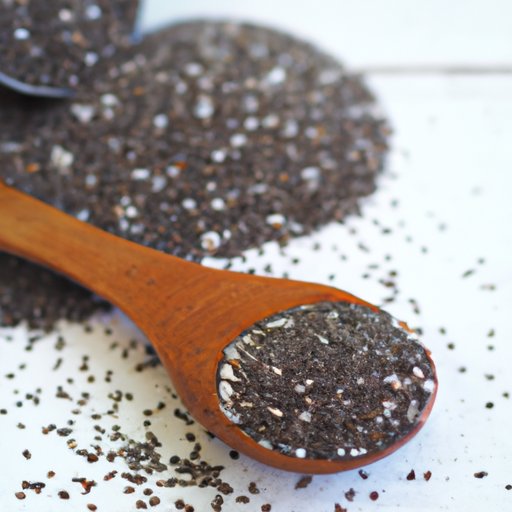Introduction
Chia seeds have become increasingly popular over recent years due to their impressive nutritional profile and health benefits. They are a nutrient-dense food that is packed with essential vitamins and minerals, as well as plenty of healthy fats, proteins, and fiber. In this article, we will explore some of the key ways in which consuming chia seeds can improve your overall health and wellbeing.

Overview of the Nutritional Profile of Chia Seeds
Chia seeds are an excellent source of essential nutrients and minerals, including calcium, magnesium, phosphorus, manganese, zinc, iron, and copper. They also contain omega-3 fatty acids, which are important for heart health, as well as a range of antioxidants that can help to protect against cell damage and disease.
In addition, chia seeds are high in both soluble and insoluble dietary fiber, with one ounce (28g) containing 11 grams of fiber. The fiber content helps to improve digestion, reduce cholesterol levels, and regulate blood sugar levels.
Why Chia Seeds are Beneficial for Health
Chia seeds are beneficial for health in a number of ways. Here, we will look at how they can help to improve digestion and metabolism, aid in weight loss, reduce inflammation, benefit cardiovascular health, and help to manage diabetes.

How Chia Seeds Help to Improve Digestion and Metabolism
The Fiber Content of Chia Seeds
As mentioned above, chia seeds are high in both soluble and insoluble dietary fiber. This type of fiber helps to keep the digestive system running smoothly by promoting regular bowel movements, reducing constipation, and preventing digestive issues such as bloating and cramps.
Fiber can also help to regulate blood sugar levels, as it slows down the absorption of glucose into the bloodstream. This can be beneficial for those who are at risk of developing type 2 diabetes or those who already have diabetes.
The Impact of Chia Seeds on Blood Sugar Levels
According to a study published in the journal Nutrition, consuming chia seeds can help to reduce spikes in blood sugar levels after meals. In the study, participants who consumed chia seeds had significantly lower post-meal blood sugar levels than those who did not.
The Role of Chia Seeds in Weight Loss
The Ability of Chia Seeds to Reduce Appetite
Chia seeds are high in protein and fiber, both of which can help to reduce appetite and cravings. Studies have shown that consuming chia seeds before meals can help to reduce hunger and increase feelings of fullness, making it easier to stick to a calorie-restricted diet.
The Effects of Chia Seeds on Metabolism
Chia seeds are also thought to boost metabolism, which can help to burn more calories throughout the day. A study published in the journal Diabetes Care found that consuming chia seeds could increase metabolic rate by up to 25%.

The Ability of Chia Seeds to Reduce Inflammation
The Anti-Inflammatory Properties of Chia Seeds
Chia seeds are rich in omega-3 fatty acids, which are known to have anti-inflammatory properties. According to a study published in the journal Nutrients, consuming chia seeds can reduce markers of inflammation in the body.
The Role of Chia Seeds in Reducing Joint Pain
The anti-inflammatory properties of chia seeds can also help to reduce joint pain and stiffness. Studies have shown that consuming chia seeds regularly can reduce symptoms of arthritis, such as pain and swelling.
The Impact of Chia Seeds on Cardiovascular Health
The Ability of Chia Seeds to Lower Blood Pressure
Chia seeds are high in omega-3 fatty acids, which can help to reduce blood pressure levels. According to a study published in the journal Hypertension, consuming chia seeds can lead to significant reductions in both systolic and diastolic blood pressure.
The Effects of Chia Seeds on Cholesterol Levels
The fiber content of chia seeds can also help to reduce cholesterol levels. Studies have found that consuming chia seeds can lead to significant reductions in total cholesterol, LDL cholesterol, and triglycerides.

The Role of Chia Seeds in Diabetes Management
The Impact of Chia Seeds on Blood Sugar Control
As mentioned above, chia seeds can help to regulate blood sugar levels by slowing down the absorption of glucose into the bloodstream. Studies have also found that consuming chia seeds can lead to significant reductions in fasting blood sugar levels.
The Effects of Chia Seeds on Insulin Sensitivity
In addition, chia seeds can help to improve insulin sensitivity. A study published in the journal Nutrition Research found that consuming chia seeds could lead to a 32% improvement in insulin sensitivity.
How Chia Seeds May Help to Protect Against Cancer
The Antioxidant Properties of Chia Seeds
Chia seeds are rich in antioxidants, which can help to protect against cell damage and reduce the risk of certain types of cancer. A study published in the journal Molecular Nutrition & Food Research found that consuming chia seeds could lead to significant reductions in markers of oxidative stress.
The Ability of Chia Seeds to Reduce Cell Damage
In addition, chia seeds may help to reduce cell damage, which can lead to cancer. A study published in the journal Molecules found that consuming chia seeds could lead to a reduction in DNA damage and oxidative stress.
Conclusion
Chia seeds are an incredibly nutritious food that can provide numerous health benefits. They are high in essential vitamins and minerals, as well as plenty of healthy fats, proteins, and fiber. Consuming chia seeds can help to improve digestion and metabolism, aid in weight loss, reduce inflammation, benefit cardiovascular health, and help to manage diabetes. They may also help to protect against cancer by reducing cell damage and oxidative stress. To reap the benefits of chia seeds, it is recommended to incorporate them into your diet in the form of smoothies, salads, granola bars, and other snacks.
(Note: Is this article not meeting your expectations? Do you have knowledge or insights to share? Unlock new opportunities and expand your reach by joining our authors team. Click Registration to join us and share your expertise with our readers.)
